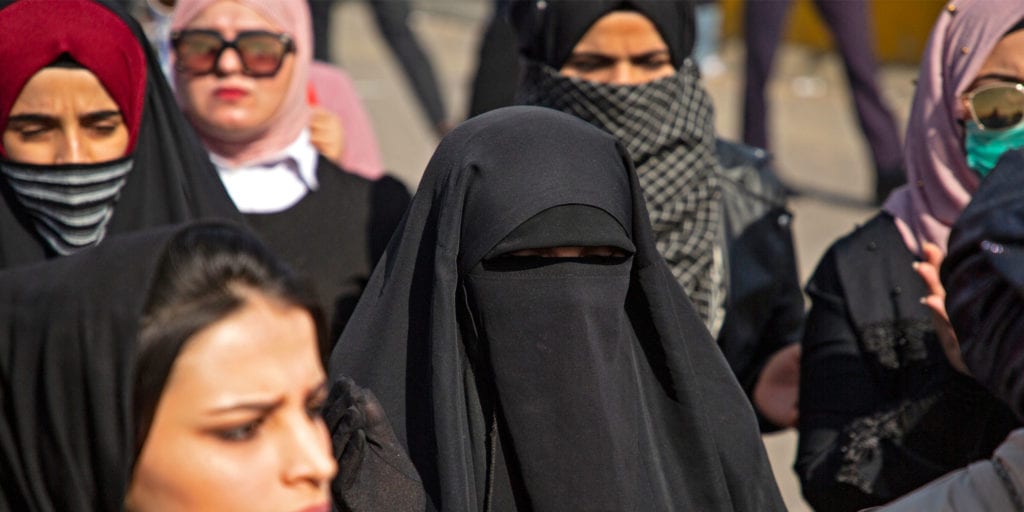How would you feel if you woke up one day to the sound of knocking on your door, only to find out that your husband had sold your house, and that you’re being asked to leave immediately?
This is Hutham Hassan’s story, who, alongside her children, was ousted onto the streets by her husband. He sold their house, married another woman, and moved to Iran in 2007. After a 20-year-long marriage, Hutham had made the mistake of granting her husband a general power of attorney to legally manage her financial affairs.
“He sold all my property to himself using the power of attorney, and ran away with another woman,” Hutham tells Daraj. “He was confident that I would not be able to take my rights as a divorcee if I filed for divorce.”

“I got married at the age of 20 to a man from the Shiite community,” Hutham continues. “At that time his beliefs were communist, and he was indifferent to religions and sects. He married me although I was Sunni. Three years into our marriage, riddled with obstacles and financial troubles, we moved to my family home, where he was treated with respect and kindness; my father treated him like a son.”
For the rest of their marriage, Hutham and her husband remained in her family’s home. After the fall of Saddam Hussein’s regime and the arrival of her husband’s family to Iraq, their relationship changed.
“With the fall of Saddam, Shiite extremism began to appear within my husband’s family,” Hutham explains. “He became religious and sectarian, and in every family gathering, his family would fuel him against Sunnis. They would provoke him in front of me, urging him to marry a second wife, sometimes jokingly, but other times very seriously.”
After the death of her parents, Hutham was surprised that she had fallen victim to her trust in her husband. “My husband disappeared, he left me in the street with three children,” she tells Daraj. “I thought about divorcing him, but he told me that I would not get anything if I file for divorce. He would tell me: ‘I will tell the court that I’m unemployed, and that all I provide you with is 750 Iraqi dinars every month, equivalent to only half an American dollar!’”
Later, Hutham found out that her husband had taken a second wife, and settled in Iran. She did not ask for divorce. “The law will not do me any justice, because of the corruption of the judiciary system and the lawyers,” she explains. “I also feared society would judge me, a divorcee at my age, or that my daughters would remain single because their mother was divorced.”
Hutham married according to Hanafi religious laws, which state that “a woman receives her rights from her second dowry, and her alimony is decided after the divorce.” This is in contrast to what the Jaafari law adopted in the Shiite community, which states that “a woman has the right to claim the second dowry during marriage, and the husband must pay it off within three years of the woman’s demand of it,” according to Judge Hadi Aziz.
Civil and Religious Conflicts
“The enactment of some paragraphs in the Personal Status Law, meaning Article 41, which stipulates that an Iraqi is free in his personal status, has in turn affected Article 14 of the Constitution, which states that Iraqis are equal in rights and duties,” Human rights lawyer, Tariq Aziz explains to Daraj. “Article 41 provides for different accountability between members of different sects, inconsistent with the principle of equality between citizens in the constitution.”
Many believe that the religious state project began in Iraq after the US invasion in 2003. Personal status laws, although they have not been subject to any amendments since 1959, are in their texts more civil than their later proposed amendments. An extreme example of this was when child marriage was legalized, what was described at the time as an amendment with an “ISIS flavor”. Fortunately for Iraqi women, the “ISIS” amendments did not pass in Parliament. Regardless, personal status laws remained as though stuck in 1959, and are in need of major updates to keep up with the times, to secure gender justice and to protect women and children.
The law is considered a permanent source of conflict between Islamists and civil rights and feminist human rights organizations within the Parliament. A proposal for a civil personal status law in 2006, which was submitted by a group of women’s organizations, as well as a proposal for the Jaafari Civil Status Law in 2013 submitted by the “Al-Fadhila” bloc were rejected. A similar proposal made by MP Hamid Al-Khudary from the “Citizen Bloc” in 2018 was also rejected.
Civil society organizations believe that Iraq is bound by the CEDAW agreement, which provides for the protection of the rights of all women. “We do not want the Iraqi government to change the Personal Status Law, in light of an unstable security and political situation, and within the presence of these representatives who view civil decisions in a purely Islamic way,” says Amal Kabbashi, a member of the “Iraqi Women’s Network and a prominent women’s rights activist.
There are many loopholes in the laws, but the biggest obstacle is with the activation of the articles of the law, as well as with the methods of implementing it.
“These loopholes are not effective and are inconsistent with the reality of women’s rights,” Kabbashi explains. “This is in addition to the fact that the biggest problem lies in the bias of judges for men at the expense of women.”
No Equality in “Infidelity”
“I went back to my house, to find him in my bed with another woman,” Rand (29) tells “Daraj”. Her husband physically attacked her after they had had a long quarrel. As a result, his wife, Rand, took her daughter and left the house. Her husband did not try to apologize or show remorse for his actions.
“He did not regret anything, nor did he try to fix the situation between us,” Rand continues. “On the contrary, he told me that he wanted to be saved from me and his daughter, but he would not get a divorce. Our daughter was about one year old and only two and a half years had passed since our marriage.”
Rand filed a lawsuit in court, demanding alimony for her and her daughter, but she did not get it, because her husband was able to prove through some witnesses that he was not employed. Therefore, the court ruled that she would get a symbolic alimony, equivalent to $50 a month. The wife filed another lawsuit to demand their separation, the reason being infidelity, “but the judge requested four witnesses from my side, to prove that my husband was with another woman in our marital bed.”
The condition appears surreal, yet it is incredibly prevalent in Iraqi personal status laws. Supposedly, each of the spouses is punished by imprisonment for a period of no less than five years in the event that either of them commits “adultery” in the marital bed, according to Article 377 of the Personal Status Law, however there is a requirement of four witnesses to testify that the adultery took place. The text of the article is clear and explicit and applies equally to husband and wife.
“But lawmakers and judges in Iraq will be satisfied with a phone message or voice call, as evidence of the wife’s betrayal,” explains lawyer Ali Salam. “But in the event of the husband’s betrayal, they apply the incurable condition stipulated in Article 377,which is the availability of four witnesses confirming the husband’s adultery.”
After a tiresome battle, Rand was able to get a divorce; after she was forced to pay bribes to the judges and a high lawyer fee. The verdict was an alimony not exceeding thirty dollars a month in return for her “freedom”. Women are constantly failing to obtain their rights in court, even with cases of marital infidelity in Iraq.
“In our society, men are not stigmatized, and the legal system has come to regard the act of infidelity as “a cancer” due to its exacerbation and spread,” Ali continues. “Iraqi society condemns married women way more often than married men; and shame is brought to the accused’s family and/or tribe.”
Infidelity in the Man’s Favor
Shamiran (30), a Christian woman from Iraq, got married at the age of seventeen. “I was not really aware at the time, my family’s circumstances were very difficult,” Shamiran, who only gave her first name, tells Daraj. After getting married, Shamiran faced many marital problems, which neither her family nor her husband’s family helped with. After having her first child, Shamiran separated from her husband after less than two years together. She did not, however, obtain a formal divorce.
“My husband changed his religion. He converted to Islam and married a second woman four years after our separation,” Shamiran explains. “That is why I decided to file a divorce complaint against him, but the lawyers I hired abandoned my case because I could not pay them. After four long years, and waiving all my rights, the court gave me my divorce.” Her husband left the country, immigrating without relinquishing his son’s guardianship.
“My son remained under his guardianship, and so we could not live a comfortable life,” she continues. “I have no right to take my son and travel with him outside Iraq, because he needs permission from his father ‘the guardian’. Therefore, I am obliged to wait until my son reaches the legal age (15), to be able to travel with him without obtaining his father’s approval.”
“The legislator allowed minors to marry in court, with the consent of their parents, and thus the marriage of minors became legal without any problem or accountability, and this is unfortunately a legislative loophole.”
Shamiran’s story is similar to the stories of many women who, likewise, suffer from the patriarchal nature of Iraqi law, in its approach to the logic of guardianship. “One of the most difficult and complicated cases is when the father leaves his wife or divorces her and leaves her with his son, while maintaining the guardianship,” Salam explains. “The mother cannot travel with her son without the guardian’s approval. In this case, the woman has to demand guardianship in court.”
Claiming guardianship in court, as a woman, can take years, according to Salam.
“Such cases require correspondence between Iraq and the embassies of the countries to which the husband has immigrated, and then the Iraqi embassy addresses the husband and discusses with him the reasons for his emigration. Then they make an attempt for him to give consent for his son to travel with his mother, a process to determine whether the father has abandoned his responsibility towards his son, in order to move the guardianship from him and grant it to the mother. This is in case the husband’s whereabouts are known. In other cases, the husbands disappear, and here the issue becomes complicated as the woman needs a guardian’s approval for her son’s affairs with every step, such as schooling, social security, and travel. If the father cannot be located, the process will take even longer, to allocate witnesses, and to complete an investigation to prove the father’s abandonment, during which the mother will remain completely helpless until the long procedures are completed.”
As we mentioned at the beginning of this investigative piece, Article 41 of the Personal Status Law has a religious, sectarian and tribal pretext. It states that “Iraqis are free with their personal status” regardless of their religion, sect or tribe. However, the interpretation of this particular article allows, for example, for a man who belongs to the Jaafari sect to marry an underaged girl of 15, without this being considered a crime. According to the Hanafi sect however, this same act is punishable by imprisonment.
“Iraqi civil law sets the legal age of marriage at 19, but despite that, the personal status laws of the sects violate those civil laws,” explains Judge Aziz.
Lawmakers in Iraq, were able to (deceptively) find a compromise between civil law and sectarian personal status laws. “The legislator allowed minors to marry in court, with the consent of their guardian, and thus the marriage of minors became legal without any obstacles or accountability, unfortunately this is a legislative loophole,” Judge Aziz continues.
“According to the Shiites, verbal divorce, which occurs as a result of nervous emotion, is not taken into law.” Therefore, divorce “should not take place outside the boundaries of the court. Here the judge and the government appointed social workers who play a role in attempting to reconcile the couple, and to give them a chance to solve their problems.”
Article 57 of the Personal Status Law No. 188 of 1959 stipulates that the mother should be given the right to custody and the right to raise the child after separation, unless the child is harmed otherwise; this is provided that the child has the choice regarding custody when he reaches the legal age of fifteen. This may be the only article that is explicitly fair to women in Iraqi laws, but still, in most cases it is not implemented and judges do not rule by it to provide justice to women.
Read Also:







